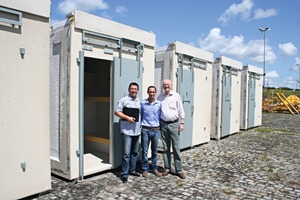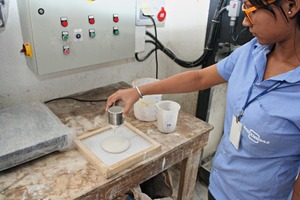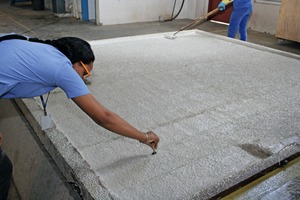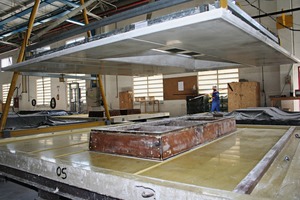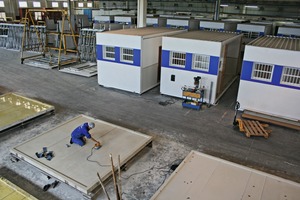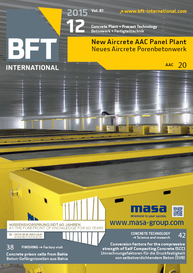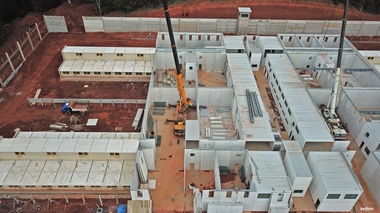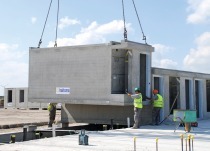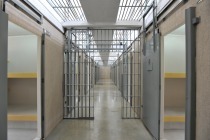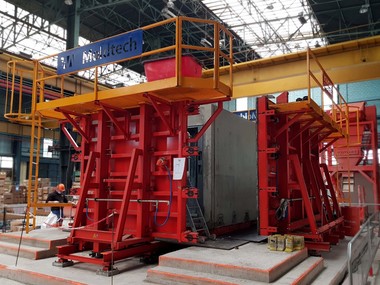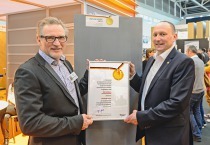Even the formwork is made of precast concrete elements
In its Pojuca plant, around 70 km north of Salvador da Bahia, the company Siscobras manufactures multi-layer container elements and in future solid concrete prison cells of very high strength and with high-quality surface finishes. The customers of these unusual products are primarily Brazilian penal institutions and police stations.
Around 15 years ago at company headquarters in Canoas, the graduated engineer Henrique Deboni and his Brother Carlos began to develop their company at todays production facility Ivotí in in the southernmost Brazilian Federal State of Rio Grande do Sul. Their work now continues in the northeast: in Pojuca near Salvador da Bahia. The familiy enterprise Sistemas Construtivos do Brasil S. A. (Siscobras), a leading manufacturer of prefabricated modular spatial systems, opened an additional plant in the spring of 2015. The hall has a size of 33,000 m², and the total area of company grounds covers 242,000 m². Production of Fastflex multi-layer container modules is already underway, and soon Siscopen will ship the first prison cells, made completely of concrete. Before that, final approval from the authorities must be obtained and the TGM concrete center put into operation.
The principal customers for these products are state institutions such as penal institutions and police stations, with an upward trend on this domestic Brazilian market. The patented Sistema Construtivo Penitenciário (Siscopen) was developed specifically for the construction of prisons and consists of high-performance concrete with concrete strength of 100 N/mm². This so-called CAD concrete (Concreto de Alto Desenpenho) makes the prison cells virtually escape- and vandal-proof. It is watertight and is even more impressive with surface qualities that stand up to comparison even with smooth-ground natural stone of high hardness.
Special formulation developed at Universidade
Federal do Rio Grande do Sul
The high strengths are here derived from a GRC concrete formulation (Glass Reinforced Concrete) developed specifically for manufacture of container modules. The constituents are quartz sand without coarse aggregate, imported white cement (CEM I 52,5 R), alkali-resistant glass fibers, special admixtures, and water. Separate reinforcement is not required, and the mix is simply installed with a spray gun, an application roller, and a trowel. The cement paste is premixed, and glass fibers are mixed in and filled into the spray gun, which separates the long glass fiber roving into precisely defined short fibers with an integrated cutting tool. During application to the concrete form surface, cement paste and glass fibers combine and, supplemented with admixtures, the fresh concrete is cast into the form without the need for additional compaction.
“Whereas previously, with conventional construction, three years were required for erection of a prison complex, this is now possible in only six months,” explained Prof. Dr. Hélio Greven, external scientific project consultant. “We successfully developed this special white-concrete formulation at the Porto Alegre in long test series.”
Precision work is done mainly by women
Siscobras, thanks to its unique selling point, is included in nearly all government projects of this kind and, in addition to contracts from Brazilian security authorities, there are now initial inquiries from neighboring South American countries. “Presently, we manufacture the new modular spatial units on three production lines with around 100 employees. But this number could soon increase to 300 if the order situation continues to develop so positively,” adds Plant Manager José Antonio Perera. “And if you ask yourself why our workforce consists of women in an industrial sector otherwise dominated by men, the reason is: Processing of white concrete requires perfect fine motor skills and high-precision handicraft.”Working the bottom ends into the metal frames into the fresh concrete requires special care so that the ends do not break out when a module is lifted out of the concrete form, following a hardening time of twelve hours.
Currently, three sandwich container modules – complete with external concrete shell, metal frame construction, core insulation, and drywall interior wall cladding – leave the Pojuca plant daily, corresponding to daily production of 18-20 concrete shells. Following commissioning of an additional existing production hall, production output is estimated to increase to ten container modules daily.
Forms made of concrete C 100/115
The fact that even the formwork used for manufacturing the thin precast modular wall panels – only 12 mm thick and with strength class C 100/115 – is made of concrete is the undisputed highlight of this production. The surfaces of these elements, 3 x 3 m each, are so even and of such low porosity that no form release agent is required prior to subsequent casting: only manual light grinding is necessary. Integration of blockouts and embedded parts – if required – is just as unproblematic. Further processing is also possible, depending on the customers’ specifications. All container modules for the police of the Federal State Bahia, for example, are provided with continuous blue external coating at the level of the window sills.
No less striking, apart from strict safety standards, is the highly developed sense of quality in the Siscobras workforce. For slump determination in the initial mix, regular checking of the precise layer thickness takes place during casting, and virtual control of correct distribution of glass fibers is assured – i.e., nothing is left to chance. Siscobras Quality Manager Thiago Siqueira says: “While we at headquarters in the deep south had initial difficulties with fluctuations due to temperature and time of day, we have nearly ideal constant conditions here so near the equator. There is therefore no need for either a curing plant or manual reworking of voids, cracks, or other visual defects.”

